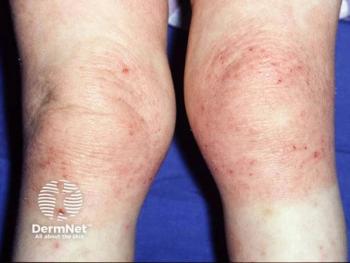
- Dermatology Times, August 2020 (Vol. 41, No. 8)
- Volume 41
- Issue 8
No evidence of increased cancer incidence in children using topical
A recent study shows no increased risk of incidence of malignancies in patients using topical tacrolimus. A black box warning on the therapy has made it challenging for physicians to prescribe, and researchers hope this evidence will lead to the FDA reconsidering that warning.
Pediatric patients with atopic dermatitis (AD) do not have an increased risk of developing malignancies after receiving topical tacrolimus therapy, according to results from a recent study.1 These findings may lay to rest any concern that the popular topical calcineurin inhibitor may cause cancer, one expert says, potentially paving the way for a reversal of the associated U.S. food and Drug Administration black box warning.
RELATED:
The topical calcineurin inhibitors including pimecrolimus and tacrolimus have been long proven as effective at addressing the AD symptoms and have become essential therapeutic tools. In contrast to topical corticosteroids that can be used for acute flares, calcineurin inhibitors are often used as a long-term therapy. Because of the history of systemically administered tacrolimus for transplant patients and its association with malignancies, tacrolimus received a black box warning from the FDA due to its theoretical risk of increased malignancies, specifically lymphoma and nonmelanoma skin cancer.
“At the time the black box warning was put into effect almost 15 years ago, there was not clinical evidence to support the concern that topical tacrolimus use could lead to an increase in the incidence of cancer and studies had suggested that the drug largely remained in the skin. While we have never personally seen a malignancy develop in a patient prescribed topical tacrolimus, it is important to have long-term data in a large group of prospectively studied children,” says Amy S. Paller, M.D., chair of the department of dermatology and professor of pediatrics, Northwestern University School of Medicine, Chicago.
Dr. Paller and fellow colleagues recently completed the APPLES study, a Prospective Pediatric Longitudinal Evaluation to Assess the Long-Term Safety of Tacrolimus Ointment for the Treatment of Atopic Dermatitis, which examined whether topical treatment with tacrolimus 0.03% or 0.% ointment increases children’s long-term risk of malignancy under actual-use conditions.
The international study quantified incident malignancies including lymphoma and other cancers over a 10-year period in children with atopic dermatitis who used topical tacrolimus for six or more weeks. At baseline and annually thereafter, patients underwent a physical examination, including skin and lymph node evaluation. Atopic dermatitis severity was evaluated every other year. Standardized Incidence Ratios for cancer events were analyzed relative to sex-, age- and race-matched control data from national cancer registries.
Of 8,071 patients who enrolled in the study, 7,954 eligible patients at 314 sites in nine countries were included in the analysis. In total, 2,125 (26%) patients could complete the study, including 1,176 who completed with 10 years of follow-up and 949 who were censored at study completion. Results showed that in over 44,629 person-years, only six confirmed incident cancers had occurred, none of which were lymphomas or nonmelanoma skin cancers.
“This evidence complements other evidence suggesting that there is no increased risk. While these results will likely make dermatologists and other practitioners even more comfortable with prescribing topical calcineurin inhibitors for their AD patients, I hope it will convince the FDA to reconsider the black box warning,” Dr. Paller says.
The black box warning has made it challenging for physicians to prescribe tacrolimus. The prescribing physician must always explain the black box warning to the patient, which is time-consuming and a difficult conversation, given that any risk of cancer for a child is frightening to parents. According to Dr. Paller, these results add an important set of 10-year data that dispute the theoretical risk of increased cancer incidence.
Disclosures:
Dr. Paller is an investigator for AbbVie, Anaptysbio, Celgene, Eli Lilly, Galderma, Incyte, Leo, Janssen, Novartis, Sanofi-Regeneron, and a consultant with hornorarium for AbbVie, Amgen, Asana, Celgene, Dermavant, Demira, Galderma, Eli Lilly, Forte, LEO Pharma Inc., Menlo, Novartis, Pfizer, Regeneron, and Sanofi-Genzyme.
Reference:
1Paller AS, Fölster-holst R, Chen SC, et al. No evidence of increased cancer incidence in children using topical tacrolimus for atopic dermatitis. J Am Acad Dermatol. 2020; [Epub ahead of print April 1, 2020] doi: https://doi.org/10.1016/ j.jaad.2020.03.075.
Articles in this issue
over 5 years ago
Survey findings inform messaging on UV exposureover 5 years ago
Studies examine ingredient safety over lifetime useover 5 years ago
Pilot study examines facial microbiome diversityover 5 years ago
Topical minocycline foam safe, well-toleratedover 5 years ago
How to eat for healthy skinover 5 years ago
Skin microbiome altered in some rosacea subtypesover 5 years ago
A new business model for dermatologyover 5 years ago
Is Covid-19 a defense to a battery charge?over 5 years ago
A ‘biomarker’ of psychiatric adverse effects with isotretinoin?Newsletter
Like what you’re reading? Subscribe to Dermatology Times for weekly updates on therapies, innovations, and real-world practice tips.











